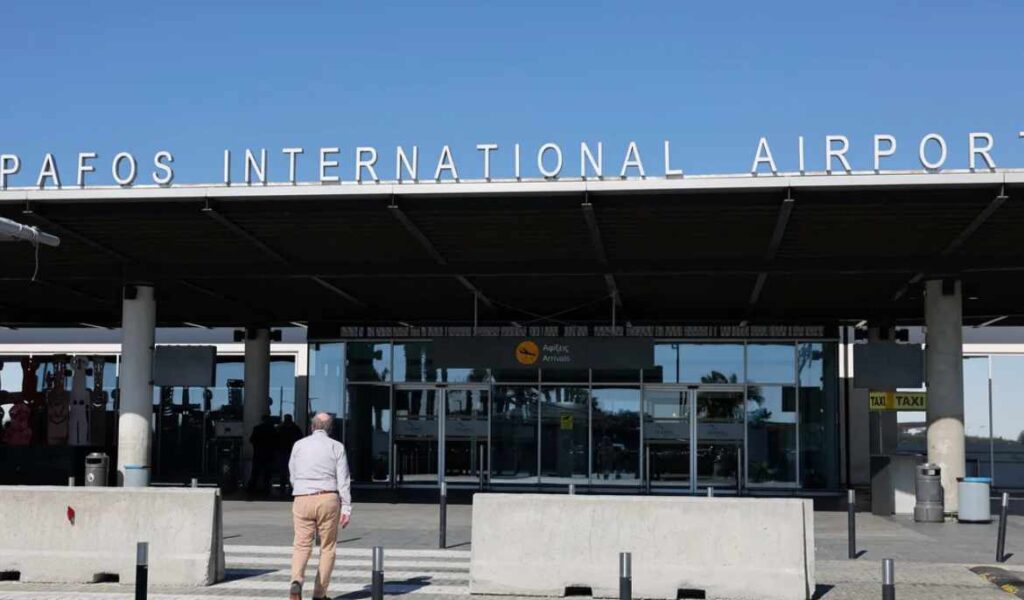Work on the second phase of development at Larnaca and Paphos airports is officially underway, with the projects expected to boost the combined annual capacity of the two hubs to more than 17 million passengers.
According to an announcement by Hermes Airports, the upgrades represent a total investment of €170 million, to be fully funded by the airport operator.
Maria Kouroupi, Director of Aviation Development, Marketing and Communication of Hermes Airports, told InBusinessNews that the works mark “a legacy for future generations of travellers,” as the infrastructure will serve long-term needs with a planning horizon up to 2040.
At Larnaca airport, the redevelopment will take approximately 30 months and affect a total area of some 20,000 square metres.
It was also mentioned that the expansion includes a new wing with departure and arrival gates connected to the main terminal, additional baggage claims belts, a new passport and security screening area, enlarged commercial zones, and more aircraft parking spaces.
Once completed, Larnaca will be able to accommodate 12.4 million passengers per year, up from its current capacity.
In parallel, the works at Paphos airport, expected to take 27 months, will increase terminal capacity by around 30 per cent, significantly improving both passenger flow and operational efficiency.
The southern parallel taxiway will also be extended, boosting flexibility on the ground.
Upon completion, Paphos airport will be able to handle up to 5 million passengers annually.
“With the completion of the projects in Larnaca and Paphos, we will create even larger and better upgraded pieces of infrastructure that we will deliver as a legacy to future generations of travellers,” she said.
“The projects will strengthen the capacity of our airports, ensuring that they can effectively respond to future needs,” Kouroupi added.
Meanwhile, Transport Minister Alexis Vafeades on Monday said that the second-phase airport expansion will “finally address persistent capacity challenges at Larnaca and Paphos”, which have “struggled for years with overcrowding and limited infrastructure“.
Responding to growing criticism over delays, especially during peak hours at Larnaca Airport, he admitted that “bottlenecks occur when several flights arrive or depart simultaneously“.
“While this is not a constant issue“, he said, “it’s a recurring one that must be tackled”.
Despite Cyprus comparing well to other European airports, Vafeades insisted the problems won’t be overlooked.
Solutions, he added, are already being studied, with priority given to avoiding future overlaps in aircraft movement and passenger flows.
Among the first measures is the full staffing of all passport control points, something he described as “the main thing that was absent until last year.”
With the cooperation of the police, these positions are expected to be filled this year, improving passenger throughput significantly.
At the same time, he acknowledged that pressure points remain, particularly in Paphos, where limited queuing areas continue to cause frustration.
Vafeades said the second-phase works were necessary precisely because the airports had outgrown their existing capacity.
The project now underway is designed not only to fix current issues, but to meet traffic demand through 2036–2037, a significant improvement over the original 2031–2032 target.
Vafeades also mentioned that other upgrades include changes to the automated passport control systems.
The current ABC Gates, used in Canada and elsewhere, do not allow families to pass together, a major drawback.
In the next phase, a mixed system will be introduced to make the process smoother for all passengers.
Vafeades also said that security is being modernised. New baggage screening devices will mean passengers may no longer need to remove liquids and laptops, speeding up checks and reducing congestion.
“These are solutions,” he noted, “but they take time to implement.” In the meantime, interim fixes are being explored.
On the question of compensatory measures for Larnaca and Dromolaxia–Meneou municipalities, the minister clarified that this issue falls under the remit of the Finance Ministry.
He said he had been briefed recently by the mayor of Larnaca and expects the matter to be handled.
Asked whether the original agreement included such measures, he stated that “no, it did not”.
“Everything continues as agreed until a decision is made to change it,” he added.



